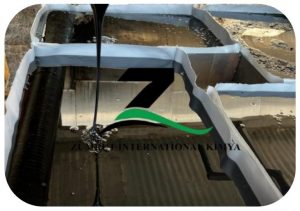
Product Description
Oxidized Bitumen 90/40, or blown asphalt, is a semi-solid industrial bituminous product resulting from air-blowing hot air over penetration bitumen (most typically 60/70 grade). The softening point of the bitumen is increased and its penetration value decreased through this process, so that the material can be utilized in applications requiring high heat resistance, water-resistance, and hardness.
The “90/40” grade is named after its softening point (around 90°C) and penetration value (40 dmm). It delivers consistent performance across temperature fluctuations and offers excellent adhesion, which is why it is a reliable choice in infrastructure, industrial coatings, and waterproofing systems.
Applications
Protective Coatings for Metals
Oxidized Bitumen 90/40 is widely used to line steel pipes, tanks, and industrial machinery where it functions as a hard, water-impervious barrier. It resists corrosion and chemical attack, particularly in the oil, gas, utility, and marine industries.
Road Construction & Repair
In pavements, this grade enhances load-carrying capacity and minimizes deformation under loads owing to heavy traffic. It’s used as a crack filler, joint sealer, and asphalt binder to provide longer road life in urban as well as rural environments.
Roofing & Waterproofing Systems
Due to its improved waterproofing properties, it is optimum for use on roofing membranes, foundation waterproofing, and damp-proofing in below-grade applications. It avoids moisture entry and thermal stress in concrete and structural components.
Industrial Adhesives and Sealants:
Oxidized Bitumen 90/40 is used as a principal component in the formulation of high-strength sealants and adhesives for the automotive and construction markets. Its bonding flexibility and thermal cycling resistance make it suitable for demanding mechanical conditions.
90/40 vs. 90/10
Oxidized Bitumen 90/40 and 90/10 share a similar softening point range of approximately 90°C but differ significantly in penetration and flexibility. The 90/40 grade has a higher penetration value (40 dmm), making it softer and more flexible, which is ideal for roofing, general waterproofing, and applications requiring good flexibility, especially in colder or moderate climates.
In contrast, the 90/10 grade has much lower penetration (about 10 dmm), resulting in a harder and more brittle material suitable for high-temperature environments or applications demanding greater thermal resistance and stiffness, such as industrial coatings or heavy-duty waterproofing. Selecting between these two depends on balancing the need for flexibility versus hardness based on the project’s climate and mechanical requirements.
|
Oxidized Bitumen 90/10 is a high-quality bitumen product manufactured via controlled air-blowing where hot air passes through grade 60/70 petroleum bitumen. The process is carried out in the absence of chemical catalysts, giving a semi-solid product with high softening point, good heat stability, and low sensitivity to temperature changes. The term “90/10” is named for its usual values for softening point (90°C) and penetration rate (10 dmm). |
Storage & Shelf Life
The product has a shelf life of 10 years and can be reheated multiple times without significant degradation. For safety and best performance, store in a cool, dry place, away from direct sunlight and moisture.
Refer to the Material Safety Data Sheet (MSDS) for additional handling and storage instructions.
Health & Safety
-
Use protective gear:
Wear gloves, goggles, and masks to prevent skin contact and inhalation of harmful vapors. -
Ensure proper ventilation:
Maintain good airflow in the work area to reduce vapor accumulation and exposure. -
Provide personnel training:
Train workers on safe handling practices and emergency procedures related to oxidized bitumen. -
Keep Safety Data Sheets (SDS) available:
Ensure SDS guidelines are accessible at all times to guide safe usage and response to incidents. -
Follow all safety protocols:
Adhering strictly to safety measures minimizes risk of injury and enhances overall workplace safety.
Packaging Options
Oxidized Bitumen 90/40 is available in various packaging sizes based on customers’ requirements:
20 kg and 50 kg Kraft paper bags
25 kg carton boxes
150 kg, 180 kg, and 200 kg steel drums
Among them, 25 kg molded pack is the easiest to handle and transport as it cools down quickly and is non-sticky. Kraft bags are reusable and available with or without pallets, offering ease in storage and shipping.
Specification of Blown Asphalt 90/40
| Bitumen 90/40 | Test method | Unit | Specification |
|---|---|---|---|
| Specific gravity @25/25 C | ASTM D70 | (Kg/m3) | 1.05 approx. |
| Penetration @ 25°c | ASTM D5 | mm/10 | 35/45 |
| Softening point °c | ASTM D36 | °C | 85/95 |
| Ductility @25 °c | ASTM D113 | Cm | 5.5min |
| Loss on heating(wt) % | ASTM D6 | Wt. % | 0.2 max |
| Flashpoint c | ASTM D92 | °C | 250 min |
| Solubility is CS2(wt) % | ASTM D4 | Wt. % | 99.5 max |
| Spot test | A.A.S.H.O.T102 | — | Negative |
Frequently Asked Questions (FAQs)
How is Oxidized Bitumen 90/40 different from the other grades?
It has higher softening points and viscosity than the others, so it would be suitable in use where it would be exposed to high heat or mechanical stress, such as in pavement applications or factory coating.
Is it okay to use it in cold weather?
While primarily designed for mild to warm climates, Oxidized Bitumen 90/40 is nonetheless usable in cold climates due to its stability. However, in extremely low temperatures, its hardness will lead to cracking.
Is it environmentally certified?
The majority of authentic Oxidized Bitumen 90/40 manufacturers adhere to ISO 14001 and other environmental standards. It’s best to request certifications from your supplier before purchase.


